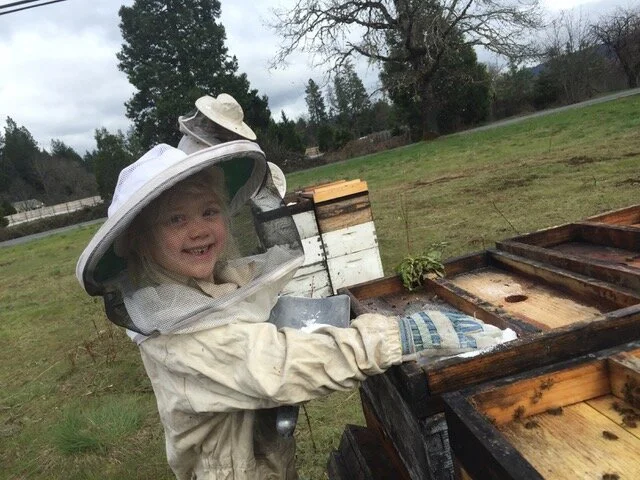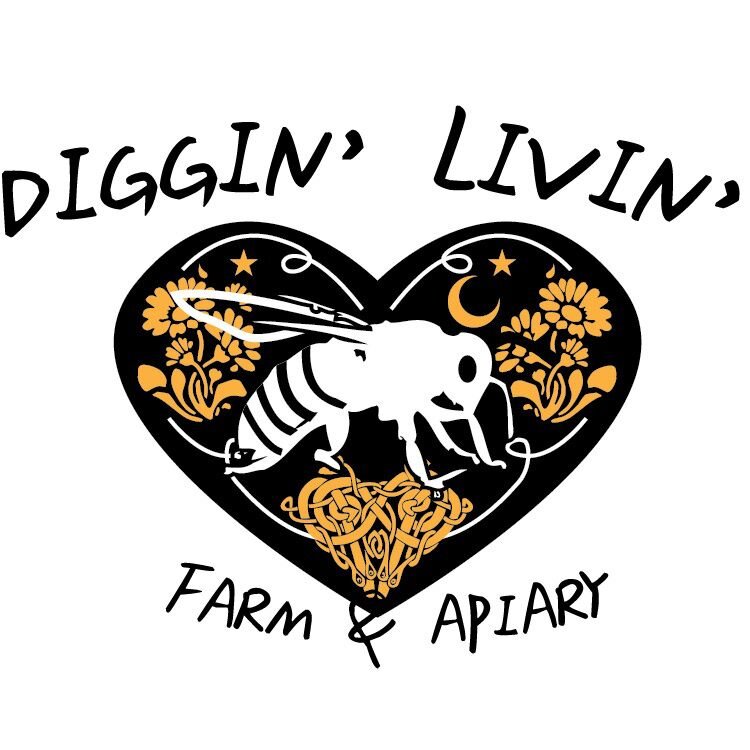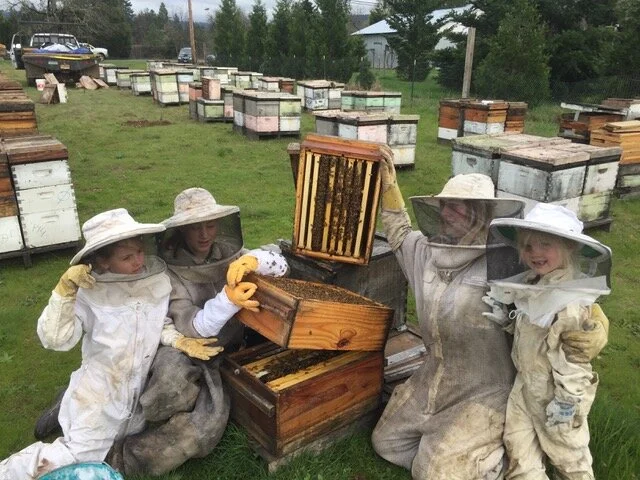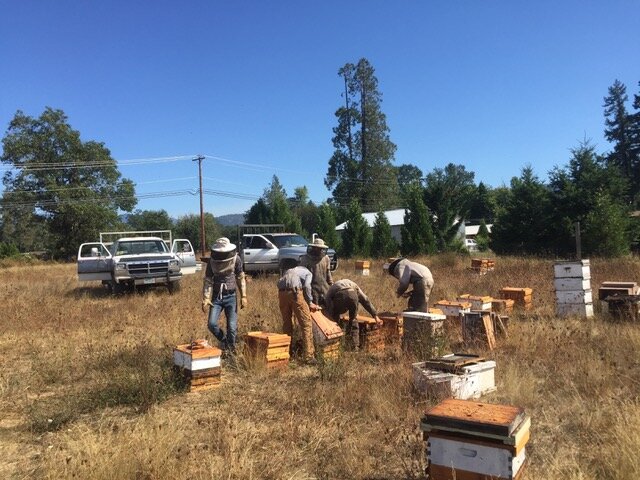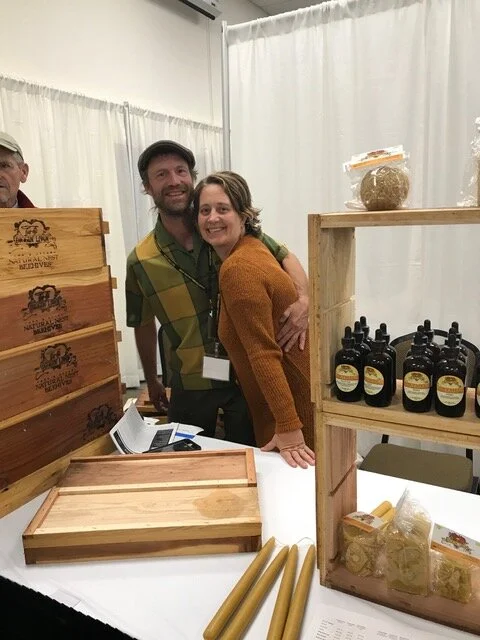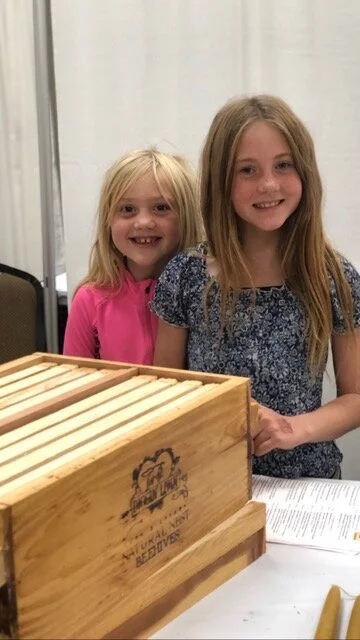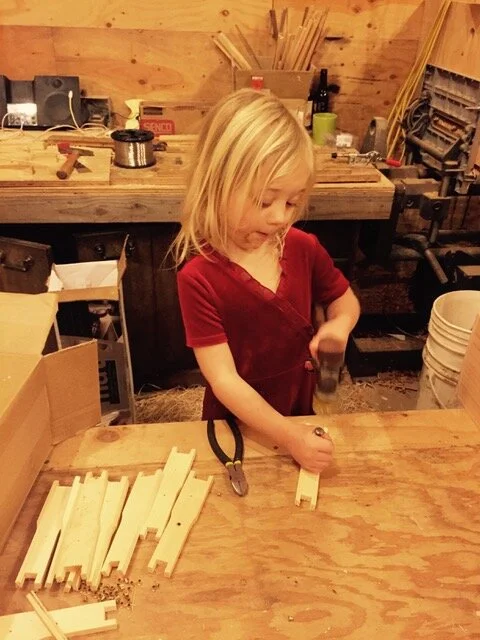It’s Usually a Bit More Complicated Than That…
Watching the February headlines evolve through the years has been interesting. February is when most beekeepers wake up their bees and shuttle them to the land known as “The Almonds.” Or if you’re in the northern Central Valley (of California), it’s “The Amends.” This time of year is when it becomes apparent how many hives of bees have died over the winter, and therefore how many bee hives will be available for the pollination of almonds and subsequent crops.
Reports splashing “above the fold” used to be about the plight of the bee and the beekeeper, but have morphed into that of demonizing beekeepers and almond farmers. Early this year my Facebook feed was filled with warnings that if you drink almond milk, you are killing all the bees, as commercial beekeepers are slave drivers and the bees, their victims.
I think we need to take a minute and think about the context here, and consider the real facts and hot emotions.
First of all – I love, nay LOVE, that people are getting so fired up and so protective of bees. And lordy knows that I’m fired up about protecting bees, but I’m also protective of my beekeeping community, and I feel that this assumption is unfair.
When you generalize anything, you’re inherently getting it wrong. When it comes to agriculture, I really don’t like seeing generalizations, because – well – it’s complicated. Explaining the true ins and outs of our food system isn’t actually very sensational. And in the end, the true power lays with the consumer. We’re not going to save the bees by banning one type of pesticide, or by boycotting plant milk to keep bees out of almond pollination. Imagining our enemies as multinational crop science corporations and commercial beekeepers feels easy, but the real culprit is us, and the decisions we make three times a day when we pick up a fork.
The real solution to “saving the bees”? Our food system needs a complete overhaul, from top to bottom.
I believe that the way forward is to “Go Small, or Go Home.” I believe supply chain management is the way to save dairy farmers, and to produce ethically sourced milk (if that’s the kind of milk you want to drink); I believe adaptive, holistic grazing is the way to save our ranchers and our soil and provide good bee habitat and a good honey crop; and I believe that buying actual local honey, and passing legislation that will demand that the FDA does their job, and halts the importation of cheap, fake honey, will save our beekeepers. I also am a strong believer of a diet based in mostly plants, with meat as a treat (instead of the other way around). Yes, I know that local, pastured meat and dairy are more expensive than the sale bin at a big box grocery store, but if you treat it at a treat – the costs even out. Or! Learn to hunt! It doesn’t get more local than that.
But all of this is up to you. You have to vote for policy makers that will enable this change at a local, state, and federal level (i.e. NOT Sonny Perdue), and you also have make the choice to support your local producers. Basically – do the opposite of dollar taco night (I know, I’m sorry, but it’s true).
The great news is, is that there are examples of what local, regenerative, small family farming looks like all over the place. Yes, even in the almonds. If you want to save the bees and take down the broken food system, my suggestion is to start whacking away at the base of the beanstalk by voting with your fork, and voting with your vote.
In an attempt to provide a balm to the scathing headlines, as of late, I asked my friend, commercial beekeeper Eric McEwen to write a guest blog from almond pollination down in California this year. I hope you enjoy the insight and perspective from Eric, and also buy his honey.
It Is Usually a Bit More Complicated Than That….
By Guest Blogger: Eric McEwen
As a beekeeper of 20 years, and someone who makes a living from tending honeybees, I have been mildly pleased with the attention that honeybees have received in the media over the past few years. National concern over honeybee losses and maladies such as Colony Collapse Disorder have contributed to a general awareness by our citizenry of the rough state of affairs with regards to our resident populations of honeybees and pollinators in general.
This culminated several years ago with our White House allocating funds for research into the causes of honeybee losses. This general heightened state of awareness has stimulated the media to ‘cover’ the topic.
Many media outlets have, in blind procession, taken their turn in publishing articles about honeybees and their keepers on the importance and controversy of food crop pollination, on the value of honey as a food, and on our honeybees’ interactions with nature, specifically, with other pollinators.
Recently I have encountered several sensationalistic pieces written about honeybees and pollination. These articles wreak of ignorance and a gross misunderstanding of the facts, and in my opinion, are damaging to the beekeeping industry. They are spreading misinformation and obscuring the actual matters of concern.
I’d like to take a moment to speak to the issues, from a beekeeper’s perspective.
As a naturalist and environmentalist, I am well aware of the concerns regarding conventional big-ag practices. And as a commercial beekeeper, I am caught in a global condition that is marginalizing farmers around the world by causing depression of the value of agricultural commodities such as my principal product, honey.
Thanks to the effects of globalization such as price depression, illegal importation, and product adulteration, honey prices are at an all-time low worldwide. Even more so when adjusted for inflation.
Though honey boasts innumerable health benefits, a variety of interesting and complex flavors, and produces a low carbon footprint for a carbohydrate, the average American consumes about 100 lbs. of sugar for every one pound of honey.
I cannot produce a pound of honey for the same low cost of sugar – a crop that externalizes costs with poverty wages and land degradation.
I am a farmer, and I enjoy producing a surplus of wholesome food for my community. However, this is challenging when over half of the honey consumed in this country is imported for as little as $1.00 per pound and likely is not even pure honey.
This is the reason that many beekeepers like myself have turned to pollination as a means of earning a living at this craft.
As a beekeeper in Southern Oregon, it is relatively easy for me to get my bees to the almond orchards of Central California. I can load our bees up on a truck and have them off before dawn. When done at appropriate temperatures, it is a fairly minor stress on the bees. Furthermore, almond pollination is not just additional income. It is very important for consumers to understand that while pollinating almonds is a risk (as with anything in farming), it usually works out very well for the bees. In the fall, prior to the onset of cold winter weather, we transport our hives to the Sierra Nevada foothills, where the climate is milder, and we can tend to the bees’ needs more easily.
This results in lower winter mortality for our hives, as we can nurse a greater number of marginal colonies to health, avoiding their starvation or other fatal problems.
I am well aware of the stories of bees being harmed in the almond orchards due to chemical exposure. I know beekeepers that have had large numbers of colonies damaged or killed in the almonds. However, this is not the norm, and if it were, beekeepers would discontinue providing pollination services. In 14 years of almond pollination, I have never experienced anything of this nature.
On the contrary, almond’s February bloom is an early spring boost of warm weather and available food that launches our hives into spring with gusto. Our colonies come home to Oregon in March with twice the winter bee population and pounds of new honey and pollen stored for navigating the remainder of spring and its inclement weather.
As for honeybee losses, winter mortality is not an unnatural event. In nature, 84% of new swarming colonies that establish a new home fail to reach their seconds spring. Being a beekeeper is about beating those odds by tending to the needs of each colony to ensure that it has enough food, is devoid of parasites and disease, and has an adequate population to survive the cold of winter.
Numero uno public enemy in beekeeping is the Varroa mite, introduced to North America in the mid-1980’s. Prior to this mite arriving in our hives, winter mortality was typically below 20% in any operation being tended by a conscientious beekeeper. Since Varroa’s introduction, losses have been over 30% annually nationwide for decades. The reason that there are still kept bees, is of course, because beekeepers. In accord with honeybees’ natural desire to reproduce at the colony level, we make up new colonies each spring from their remaining survivors.
Recently, media sources in their hurry to point a finger at someone for this ‘national emergency’ have tried to suggest that almond pollination is correlated somehow with bee mortality. Personally, I feel that nothing could be further from the truth. In fact, the numbers suggest that the almond industry is keeping the beekeepers afloat. Without this early annual income, beekeepers might lack the resources to tend their bees with such rigor, resulting in more poorly cared for colonies.
Furthermore, these strong colonies go on to provide most of the “starter” packages and nucleus colonies that are purchased each year by hobby beekeepers. In our case, at least, our colonies come back to Oregon strong, thereby making it more likely that we will produce a surplus honey crop in late spring and early summer in Oregon, something that is sometimes difficult to do.
In short, it seems to me that beekeeping will be an important part of the agrarian landscape for the foreseeable future, and while the almond industry and conventional farming have a long way to go before their practices can be called sustainable, the almond industry is growing a nutrient-dense food that is improving the nutrition of many peoples’ and bees’ diets.
If honey were appropriately valued as the food that it is and we weren’t so reliant on pollination checks, beekeepers would be in a stronger position to unionize and lobby for positive change in growing practices.
So, if you’re against conventional agriculture’s misuse of our soil and poisoning of our land and water, then it behooves you to buy and eat more local honey. Know your beekeeper and pay them accordingly.
Lastly, if you’re concerned for the native pollinators out there, stop taking it out on the honeybee. Instead, fight for habitat conservation and rehabilitation, cause it’s really all about natural space for homes and flowers when it comes to our native pollinators.
• • •
Eric McEwen heads the beekeeping operation for Diggin Livin Farm and Apiaries LLC. Located in the Illinois River Valley of Southwest Oregon, they steward beehives from the Applegate Valley to the East, and to the Smith River drainage west to the coast. They have kept bees here for 16 years, after moving south from Corvallis OR, where he and business owner Joy McEwen met attending Oregon State University, where they were gifted their first hive by students from the OSU Honeybee Lab. Eric specializes in the development of organic management practices for their 600 colonies. He and Joy craft a whole line of value-added honeybee products including varietal honeys, beewax candles, a line of honey based medicines, propolis tincture, and a line of Jun kombucha. He has been a mentor for the OSU Master Beekeeper Program, and currently serves as Southern Oregon Representative on the Oregon State Beekeepers’ Association’s Administrative Board. He is also the designer and manufacturer of Natural Nest Beehives, a line of 8-frame Langstroth equipment for organic beekeeping packed with features. Eric is also a trained naturalist, and loves the wild side of the great outdoors.

